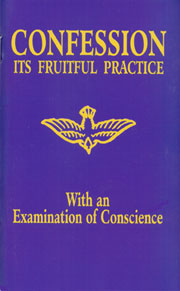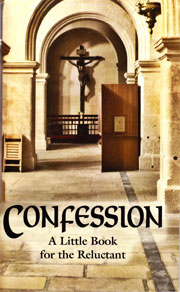CONFESSION PRAYERS

THE FIVE FIRST SATURDAYS IS A DEVOTION NEEDED NOW MORE THAN EVER! FIND OUT MORE HERE
THE SAINT MICHAEL PRAYER AND THE ROSARY
ARE ALSO POWERFUL PRAYERS TO HELP US THROUGH THESE VERY TURBULENT TIMES!
HIGHLY RECOMMENDED! DELIVERANCE PRAYERS,
A BOOK FROM SENSUS TRADITIONIS PRESS
(A GREAT PUBLISHER HELPING US FIGHT OUR MANY SPIRITUAL BATTLES NOWADAYS)!
CHECK OUT OUR PODCAST PAGE AND OUR YOUTUBE CHANNEL FOR INSPIRING CONTENT
Prayers for Confession can be an important part of this very special Sacrament (also known as the Sacrament of Penance) instituted by our Lord for the forgiveness of sins. We wish to offer here some moving and helpful prayers to say before Confession as well as afterwards.
From Confession we can receive God’s forgiveness for the sins that plague us and hinder our path to holiness (through the priest who acts in His name). We also can get much needed strength and grace from God to resist temptations to commit these sins in the future. In so doing, we draw closer to our Lord in our journey towards Eternal Life with Him in heaven.
Many Christians, including some Catholics, fall prey to the misconception that they don’t need to see a priest to confess their sins, but, rather, that going straight to God in prayer should suffice. The problem with this notion is that our Lord specifically instituted the Sacrament of Penance Himself after His resurrection, when he told His apostles “Whose sins you shall forgive, they are forgiven them; and whose sins you shall retain, they are retained” (John 20:23).
He meant for their successors, namely the priests of His church, to forgive sins in His name. (Indeed, the Council of Trent said that this power to forgive sins is made manifest in the Sacrament of Penance.) Remember that the priest who hears your Confession is acting in persona Christi, that is to say in the person of Christ. Also, priests can give you good advice or inspiring words from scripture to help you. That’s another benefit you wouldn’t get just confessing your sins to God at home!
Going to confession regularly can also help free you from emotional problems that you might otherwise develop in trying to suppress a guilty conscience from your sins. Don’t you usually feel better when you get something that’s been bothering you off your chest?
As Bishop Fulton Sheen once put it, “Regular confession prevents sins, worries and anxieties from seeping down into the unconscious and degenerating into melancholy fears and neuroses.” While psychiatry or therapy may be necessary for some, this wonderful Sacrament can work quite well in helping us cope with the weaknesses and stresses in our daily lives.
It is ironic that, while society today readily forgives celebrities their transgressions if they just apologize for them publicly, many in our faith have lost sight of the critical importance of apologizing for our sins to the one who matters most in our Eternal Destiny, Our Lord, by going to Confession.
This problem is exacerbated in some cases by both a shortage of priests and available confession times in some parishes. You can find confession schedules listed in this very helpful website that lists Mass times as well.
It is important to note that a good confession requires us to examine our consciences thoroughly for the sins we’ve committed beforehand, to feel genuine contrition for them, and to do the penance then prescribed by the priest after the confession with a firm purpose of amending our lives. (This penance is often a short prayer or prayers such as the Our Father, and the Hail Mary, for example.)
But how do we know what sins to confess? In a society that has lost much of a real sense of sin, an examination of conscience such as this one can help you discern your sins. You can find several other good such examinations in prayer books and on the internet. They often use the Ten Commandments as a guide.
Our Faith recognizes the distinction between two types of sin: venial and mortal, as discussed here. Venial sins can weaken our relationship with God. Mortal sins, if left unconfessed and unrepented can kill it, by shutting us out from God’s sanctifying grace, the supernatural life of God in our souls! (Hence the name.)
(Think of mortal sins as being a cancer on the soul and venial sin as more like a cold.) All sins separate us from God to one degree or another, but as St. John said in one of his letters “not all sin is deadly” (1 John 5:17).
Certain sins are considered mortal, such as murder, abortion, theft, adultery, and sex outside of marriage. Others may be mortal or venial depending on the degree of sin. Gossiping about someone, for example, may be venial if you’re just sharing some information about them. If you’re slandering them, however, that sin becomes mortal.
Drinking a glass of wine or beer after a hard day’s work is not sinful in itself, for another example. After all, didn’t Our Lord turn water into wine at the wedding feast at Cana (John 2:1-10)? But willfully getting “hammered”, drinking too much on a regular basis, puts you in mortal sin territory!
Speaking of this being “willful”, note also that there are three important conditions for a sin to be mortal: The sin must be grave, we must know that it is grave, and yet commit it anyway with our full consent. We put our souls in grave danger when we don’t confess our mortal sins. A single deliberately unconfessed mortal sin can land us in Hell and eternal separation from God! Keep in mind also that you should never receive Holy Communion if you are aware of having committed a mortal sin without first having it absolved in Confession.
While our faith requires us to confess mortal sins at least once a year, we have the option to confess venial ones to a priest as well, and this is highly recommended. As the Catechism of the Catholic Church expresses it: “The regular confession of our venial sins helps us to form our conscience, fight against evil tendencies, let ourselves be healed by Christ and progress in the life of the Spirit." (CCC1458)
When going to Confession, tell the priest as fully as possible the number and nature of the mortal sins you've committed since your last confession, and whatever venial ones as well. And don’t worry if you’ve forgotten to mention a mortal sin. Just confess that sin at your next available opportunity once you remember it, but don’t take communion until it’s been absolved by a priest!
Note also that the Catholic Church speaks of two types of contrition: Perfect and Imperfect. With Perfect Contrition, as we say in the Act of Contrition after Confession, we are sorry for our sins because they offend God, much as we would be if we offended someone special (which our Lord wishes to be to us in any case)!
With Imperfect Contrition our sorrow for our sins is more mixed with fear of God’s punishment. Either one is sufficient for a good confession, although we should strive to treat our Lord as we would a close friend. You wouldn't want to hurt someone like that would you?
The Sacrament of Penance gives us a great opportunity to receive our Lord’s graces to avoid and resist sin. That doesn’t mean we might not struggle with our sins and need to confess them again when we slip up. (Maybe again and again!)
Still, when you fall down, don’t despair! Get back up again in this sacrament as soon as possible to get God’s grace and forgiveness. The devil is good at enticing us to sin by blinding us as to God’s justice beforehand and then, once we’ve sinned, blinding us instead as to God’s mercy and enticing us into despair instead. Don’t fall for that trap! Avoid sin and its occasions as fully as possible, but when you slip up, get back to confession. The priest is there to help restore your soul to its former state of grace.
Remember that our Creator died on the Cross “for the forgiveness of sins” so that we might be able to share Eternal Life with Him. The popular expression that “God loves the sinner but hates the sin” applies here. Our Lord doesn’t want to lose any of us. The Gospels include wonderful references to God’s mercy, such as in the parable of the prodigal son (Luke 15:11-32).
Jesus Himself told Saint Faustina, in one of His many private revelations to her in the 1930’s, “My Heart overflows with great mercy for souls and especially for poor sinners…For them I dwell in the tabernacle as the King of Mercy.”
Keep in mind as well that there is no need to feel any shame in this process! Having to confess your sins to another person, the priest, requires a great deal of humility, a virture par excellence in the eyes of our Lord.
And don’t worry that what you say won’t be kept confidential. If a priest reveals anything of what you’ve said to anyone, that is grounds for his excommunication from the Church. That’s how important Jesus values your privacy in confiding in Him through his priests!
Also, don't be concerned that your sins are too big to confess or that it’s been too long since your last confession. These worries should never keep you away from the confessional. And don’t ever feel you sins aren’t “big enough” either! Your examination of conscience beforehand might turn up some petty vices you haven’t been able to shake.
Regular confession can help you defeat those impulses that hinder your spiritual advancement, such as anger, envy, lust, and pride, (which are among the Seven deadly sins).
Noted psychologist, author and EWTN radio host Ray Guarendi once called Confession “a fabulous opportunity to basically say ‘Dear Lord, guide me to look at myself and to understand all the ways that I am not living for you, and with your grace and strength, I can improve.’ …..Confessing our sins gives us a perfect opportunity to get God’s love, mercy, forgiveness, and to make right what we can make right.”
FROM OUR BOOK AND GIFT STORE
OR CAFE PRESS STORE!
Return from Confession Prayers
to Home Page
















